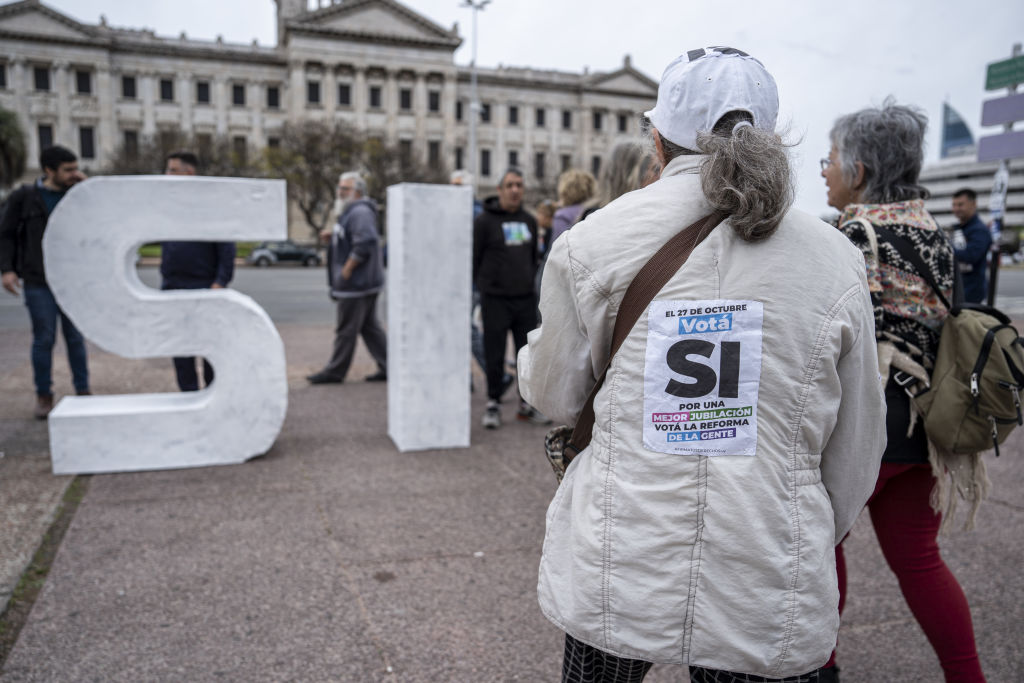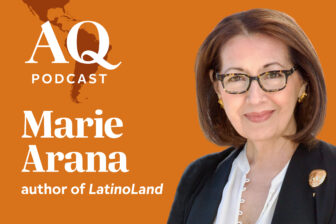Uruguayans will go to the polls on October 27 to vote for their next president and representatives in both houses of Congress and cast ballots on two plebiscites to reform the constitution. The leading candidates in the presidential race are former intendant of Canelones department Yamandú Orsi, of the opposition left-wing Frente Amplio, and former chief of Cabinet to President Lacalle Pou, Álvaro Delgado, of the governing center-right Partido Nacional. Polls show that these two are the favorites to represent their respective coalitions in a probable second-round runoff election scheduled for November 24, with public safety as the top concern for voters.
Polling also indicates that the youngest presidential candidate in the race, Andrés Ojeda of the center-right Partido Colorado, is gaining momentum and is nipping at the heels of Delgado’s once-commanding lead within their coalition. The policy differences between Ojeda and Delgado are relatively minor, but Ojeda’s youth and demeanor are reminiscent of Lacalle Pou, and his more vibrant, social media-focused campaign has catapulted him to become a viable candidate for the runoff.
Voters will also consider two plebiscites to reform the constitution. The first, if passed, would allow for nighttime police raids, which are currently banned by the constitution. Polls suggest voters are likely to approve this reform, owing to their high level of concern with crime. The other referendum considers a constitutional reform that would make pensions more generous and eliminate the private pillar of the pension system. If approved, this reform could have far-reaching implications for the economy and governance under the next administration.
Photo finish
Many recent elections in Latin America have been defined by voters’ widespread anti-incumbency sentiment, with unpopular outgoing presidents and a general sense of economic malaise. Uruguay is bucking this trend: Citizens will head to the polls with a popular president, consumer sentiment in positive territory with both employment and real salaries on the rise, and poverty declining (albeit still higher than pre-pandemic levels). Although longstanding concerns about the high cost of living and crime persist, there are few indications that voters are clamoring for significant political change.
The presidential race’s competitiveness stands out in this otherwise benign context. Polls show that Orsi has maintained his lead with voters, with about 44% of voters backing the left-wing candidate, according to a September survey by Factum. Delgado has 27% voter intention; however, if the parties within his coalition are summed up, they have 49% voter intention. Polling from Cifra shows a more complicated outlook for the coalition, with 41% of voter intention compared to 44% for the Frente Amplio.
According to another Factum poll, 55% say they believe the Frente Amplio will win the election. Delgado’s challenge is to maintain voters’ support in the more ideologically heterogeneous coalition, which spans from the centrism of the Partido Independiente to the right-wing populism of Cabildo Abierto.
It is unlikely that any candidate will win the race in the first round, so the campaign for the runoff will depend on the margin between the two parties in the October 27 vote. Another milestone will be a legally mandated presidential debate for the candidates who make it to the runoff election. Delgado has a leg up, given that his party has released a lond and detailed policy manifesto, and he has had significant media exposure as Lacalle Pou’s chief of Cabinet and on the campaign trail.
Orsi has been criticized for not giving in-depth media interviews and for not providing policy details. His vice presidential running mate, Carolina Cosse, says the party will release a detailed manifesto after the first-round vote. The failure to stress-test now is a risk for Orsi: If his proposals prove unpopular, he will have little time to adjust his policies or messaging.
Our forecasts at the EIU assume that Delgado will eke out a narrow victory, owing to favorable economic indicators and his position as the continuity candidate of the popular outgoing president. It is likely that the leaders of the other coalition parties will quickly endorse Delgado and also help to construct a joint policy agenda, as they did in 2019 to reassure undecided voters. Even so, a vigorous campaign by Orsi that addresses the uncertainties related to the Frente Amplio’s policy agenda, or a poor campaign by Delgado, could tip the scales and lead to an Orsi victory.
The elephant in the room
Unlike previous presidential elections, this year’s race has been eclipsed by the plebiscite to reform the constitution to backtrack elements of the pension reform the government passed in 2023, as well as introduce new reforms that would make pensions more generous and eliminate the private pillar of Uruguay’s pension system. The reform has stirred controversy, as its provisions would absorb much of the next administration’s bandwidth to pursue fiscal consolidation and pass necessary reforms to make Uruguay’s economy more competitive.
If the referendum were to pass, the impact on the economy and the next government’s agenda would be huge. In the short run, tying the minimum pension to the minimum salary would impose an enormous fiscal burden of upwards of $1.5 billion on the state. This would limit the policy space for the next administration and hinder any fiscal consolidation effort, which Uruguay needs to pursue to reduce its high public debt burden and maintain investment-grade status. There is also the risk of legal and reputational costs with the end of the private pension system, which has over $20 billion in savings.
Given the dire implications of the plebiscite, all major party leaders have come out against the initiative. Even a group of 112 economists aligned with the Frente Amplio have publicly opposed the referendum, including Gabriel Oddone, who would become the economy minister under Orsi. Polls show that support for the plebiscite has gradually declined, and only 39% of respondents in a September study from Equipos Consultores say they will vote against the measure.
If the plebiscite passes in spite of the broad political establishment’s opposition, it could create a serious crisis of representation and hobble the next government, as it will be preoccupied with how to manage the fallout, akin to Brexit in the UK. Even if the referendum is rejected, another pension reform process will likely commence and dominate politics for the foreseeable future.









